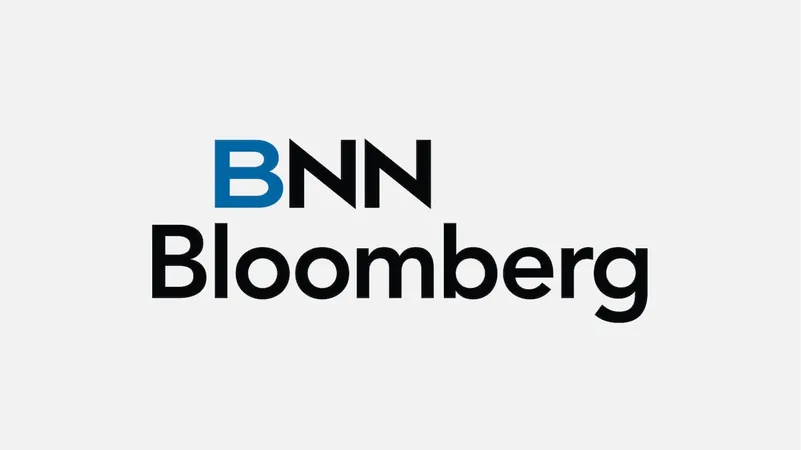
Canadians on the Verge of Dominating ETF Sales: A New Era for DIY Investors!
2024-12-27
Author: Amelia
A Financial Revolution for DIY Investors
Canadians are embarking on a financial revolution as the do-it-yourself (DIY) investing trend reaches a critical juncture. Recent data suggests that DIY investors may soon outnumber their adviser-dependent counterparts in holding exchange-traded fund (ETF) assets, marking a dramatic shift in the investment landscape that has been predominantly led by brokerage clients for decades.
Surge in ETF Assets
As of November 30, 2024, the total ETF assets in Canada surged past the impressive $517 billion milestone, representing an influx of over $65 billion in new investments within the first 11 months of the year, according to National Bank Financial. Rohit Mehta, CEO of Global X ETFs Canada, attributes this growth to the increasing appeal of DIY investing among Canadians. He states, “Canadians are eager to engage with the bull market, particularly through ETFs, which simplify investing and provide access to previously unavailable asset classes and strategies.”
A Historic Shift
With the year nearly at an end, the industry stands at the brink of a historic shift. DIY investors are now closer than ever to holding a majority of ETF assets, as their contributions increasingly eclipse those of traditional investors reliant on advisors. A recent report from Toronto-based Investor Economics highlights that ETF assets in discount brokerage channels surged by nearly 52% in the first nine months of 2024, significantly outpacing the 31.5% growth seen in full-service brokerage accounts.
Data on ETF Assets
Current data reveals approximately $174 billion in ETF assets still lies within full-service brokerage accounts, while DIY investors manage a staggering $173.2 billion through online discount brokers—an increase from $114.2 billion just a year prior. This trend is considerably driven by younger generations opting for digital channels to manage their investments independently.
Challenges in Financial Advice
Carlos Cardone, Senior Managing Director at Investor Economics, emphasizes the changing dynamics around financial advisement, noting that the post-pandemic landscape has made it increasingly difficult for many individuals to access personalized financial planning. “Investors with smaller portfolios face challenges in receiving advice, as advisers have shifted focus towards higher net worth clients,” Cardone explains.
Changing Thresholds for Financial Advice
This shift has advanced the threshold for financial advice from the $100,000 to $150,000 range to now requiring $200,000 to $250,000 in investable assets, pushing many investors towards self-directed online brokerage accounts.
Record ETF Sales
Linda Ma, an ETF research analyst at National Bank, indicates that the ETF sales for the first 11 months of 2024 have already surpassed the annual record of $53 billion set in 2021 during the height of the pandemic. The remarkable growth in Canadian ETFs is largely fueled by robust interest in U.S. equity ETFs, which garnered $18.8 billion in sales, alongside asset allocation ETFs that attracted $9.7 billion.
Popularity of Asset Allocation ETFs
Asset allocation ETFs have gained popularity since their introduction to the Canadian market in 2018, providing diverse portfolios that automatically adjust based on risk profiles. These funds have maintained a track record of no outflows in over five years, even during challenging market conditions like those witnessed in 2022.
Cost-Effectiveness Drives Interest
According to Sal D’Angelo, Head of Product at Vanguard Canada, the driving force behind the rise of asset allocation funds is the growing preference among retail investors for cost-effective, globally diversified strategies. “Investors are increasingly aware of how costs impact long-term returns, making these products particularly appealing,” D’Angelo remarks.
Empowering DIY Investors
With DIY investors capitalizing on innovative investment strategies and the ETF market booming, the landscape of Canadian investing is evolving rapidly—empowering more individuals to take charge of their financial futures!









 Brasil (PT)
Brasil (PT)
 Canada (EN)
Canada (EN)
 Chile (ES)
Chile (ES)
 España (ES)
España (ES)
 France (FR)
France (FR)
 Hong Kong (EN)
Hong Kong (EN)
 Italia (IT)
Italia (IT)
 日本 (JA)
日本 (JA)
 Magyarország (HU)
Magyarország (HU)
 Norge (NO)
Norge (NO)
 Polska (PL)
Polska (PL)
 Schweiz (DE)
Schweiz (DE)
 Singapore (EN)
Singapore (EN)
 Sverige (SV)
Sverige (SV)
 Suomi (FI)
Suomi (FI)
 Türkiye (TR)
Türkiye (TR)